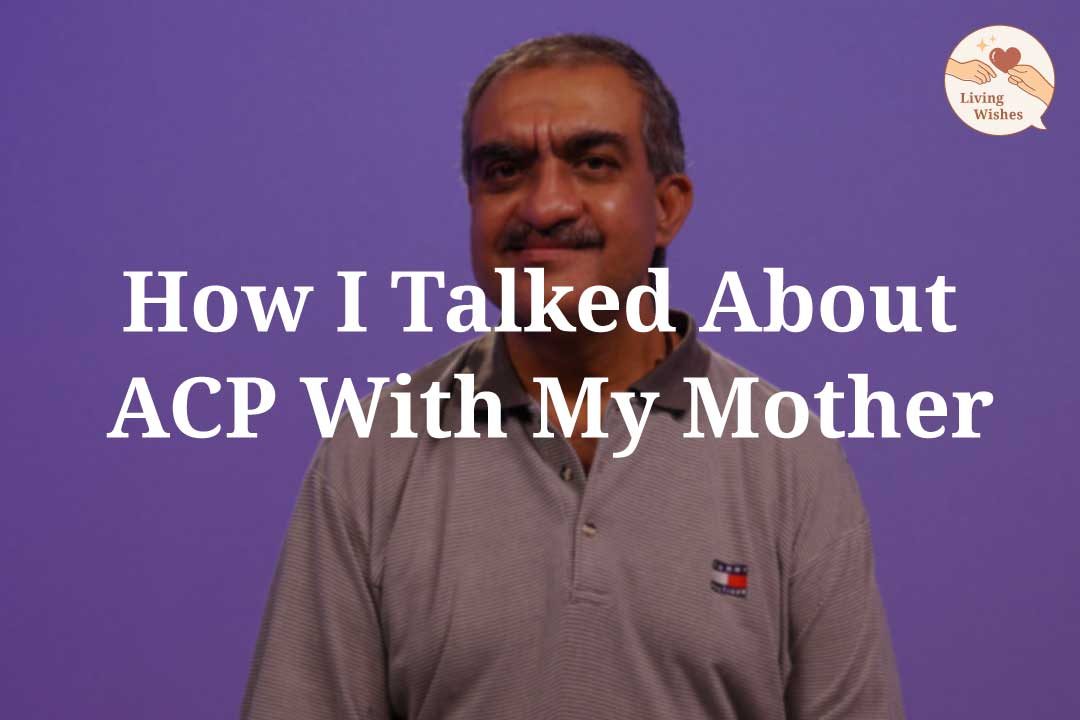How I Talked About ACP With My Mother

In December 2017, Siwakant Misir’s mother suffered a heart attack. After a check-up by the doctor, the family received the unfortunate news that her heart was only functioning at 20 percent.
Knowing that a medical crisis may happen at any time, they had an Advance Care Planning (ACP) discussion to find out how she would prefer to be taken care of should she be unable to make decisions for herself.
“It was lucky that we spoke about it,” said Siwa, 56. “At least everyone was prepared and we knew which direction to take when the time came.”
Challenges Faced During an ACP Discussion
Their ACP conversation began when the doctor told the both of them about the diagnosis of Siwa’s mother. Aware that her health was deteriorating, she expressed her wish to withhold life-sustaining treatments.

Following their mother’s wishes, Siwa’s family saw that she was more comfortable and at peace passing on at home.
She also shared that her preferred place of care and death was at home and that she would like to focus on comfort. This helped the family decide to arrange for hospice staff to drop by her home weekly to evaluate her health and well-being instead of staying in a hospital as suggested by her doctor.
It was also decided that Siwa would be her Nominated Healthcare Spokesperson (NHS), and that her personal values to facilitate the decision-making process were based on her beliefs in Hinduism.
Before his mother passed away in 2019, Siwa had continued to ask about her preferences to see if her thoughts had changed over time, as ACP is an ongoing process.
While Siwa found the conversation comfortable to facilitate as his mother was open to talking about her preferences, the experience was still not without its challenges. “The greatest challenge was how to explain that it was near end-of-life,” he shared.
He added: “We are human, we will feel sad. Even though I know my mother has said her preferences, when it came to the crux of it, it was difficult. But I also know that there’s no point in letting her suffer.”
Tips to Initiate an ACP Discussion
To help us have an ACP conversation with our loved ones just as he did, Siwa shared some advice based on his experience.
He suggested having a good understanding of our parents’ medical condition and monitoring their progress. Any changes to their health can indicate to both parties that it’s an appropriate time to talk about ACP.
During the conversation, we should also show empathy to our parents and their responses. If they do not seem comfortable talking about it yet, they should not be forced into having the conversation. Instead, we can ease them into an ACP discussion slowly and casually.
Lastly, Siwa recommends having ACP conversations early, when our parents are still healthy. “Try to talk earlier before things deteriorate. It is always good to talk way before death, because you never know how death occurs,” he said.
It is important to learn about your parents’ ACP preferences to ensure they receive the type of care they want and to guide your family in making healthcare decisions in future. As their children, you play an important part in helping your parents do ACP. While such conversations may not be easy, they are beneficial in improving your relationship and communication with your parents.
To learn more, read our guide on how to start Advance Care Planning conversations, or watch Siwa share about his experience on our YouTube channel!